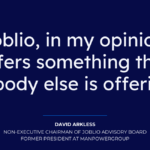
As more employers adopt diverse hiring practices, including welcoming refugees and immigrants to their workforce, they’re realizing a range of benefits – including the ability to fill high-demand positions the domestic workforce lacks workers for. Yet as with any hiring strategy, retention remains key.
Mark Reimann, U.S. Country Manager and VP of Government Affairs for Joblio, offers some simple actions Joblio partners can take to ensure their new employees of various backgrounds thrive.
Carpooling
As workers emigrate from their home countries, they often lack access to transportation until they’re able to save enough money to purchase a vehicle.
Reimann says employers have taken steps to coordinate carpools for their new employees in partnership with Joblio’s Applicant Concierge Experience, a program designed to support new hires. Particularly in Western New York, public transportation services may not conveniently allow employees to commute for their shifts.
“Joblio can work with employers and workers to help with transportation temporarily,” he explains. “Once the new employees are established and up-and-running, they quickly become self-sufficient.”
Space accommodations
Some employers have the ability to set aside areas of their office for their workers’ cultural and spiritual needs. For example, Reimann shares Innovative Concepts in Entertainment, maker of Super Chexx Bubble Hockey table game, dedicated space to create a prayer room.
“Small changes can help ensure employees from other countries and cultures feel welcome, which ultimately leads to high retention — a win, win for employers and employees,” says Reimann.
ESL classes
Particularly with hands-on, labor-intensive jobs, communication is vitally important — not just for efficiency, but for safety.
Joblio’s partners offer solutions to possible language gaps. For example, McGard, an Orchard Park manufacturer of security products, offers English as an Additional Language (EAL/ESL) classes to employees on site.
“The world of work is cross-cultural,” Reimann emphasizes. “If you’re willing to embrace that next wave of workers, those are the companies that are going to get ahead.”






